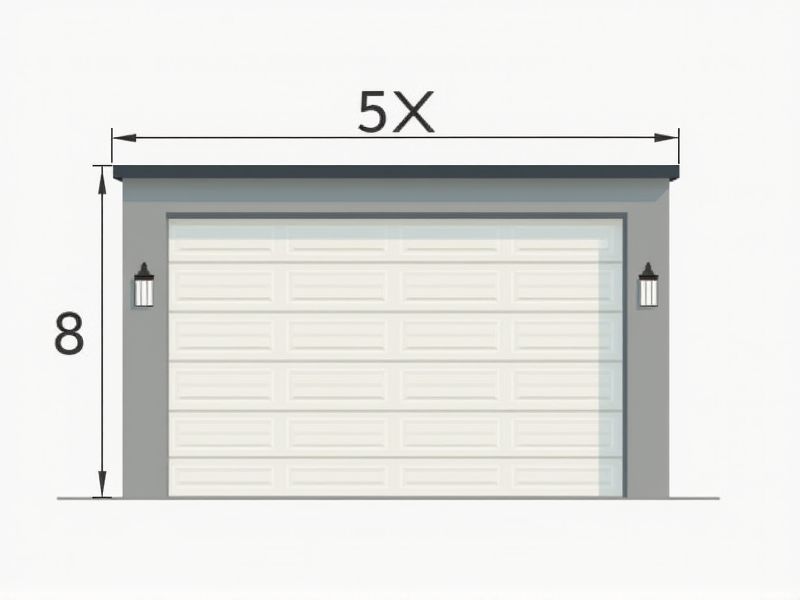
When planning for a new garage door, it's helpful to know the typical dimensions to ensure a proper fit. Standard single garage doors usually measure 8 feet wide by 7 feet high, while double garage doors often come in at 16 feet wide by 7 feet high. However, options like 9x7 feet or 10x8 feet are also available to accommodate larger vehicles or storage needs. Checking these standard measurements can make it easier to communicate with suppliers and avoid costly customization.
Height
The standard height of a residential garage door is typically 7 feet, with options available for taller spaces reaching up to 8 or 9 feet. This height accommodates most vehicles, including SUVs and trucks, while ensuring ease of access for various equipment. Custom garage doors can be tailored to heights exceeding 10 feet for specialized needs or larger vehicles. When selecting a garage door, it's essential to consider both the height and your personal requirements for optimal functionality and aesthetics.
Width
A standard garage door typically measures 16 feet in width, accommodating two-car garages, while single-car garage doors usually measure 9 feet wide. The width of your garage door is crucial for ensuring easy maneuverability of vehicles, especially larger ones like SUVs and trucks. Homeowners should also consider the height, which commonly ranges from 7 to 8 feet, to suit various vehicle sizes. Understanding these measurements can help you select the ideal garage door that meets your needs and enhances your home's curb appeal.
Single-Car Dimensions
A standard single-car garage door typically measures 8 to 9 feet wide and 7 to 8 feet tall, accommodating most vehicles comfortably. For precise fit, the most common dimensions are 8 feet (width) by 7 feet (height) or 9 feet (width) by 7 feet (height). It's important to consider the headroom above the door; a minimum of 12 to 18 inches is recommended for proper installation of the door opener. Ultimately, these dimensions ensure ease of access and functional use for your vehicle and any additional storage needs in your garage.
Double-Car Dimensions
A standard double-car garage door typically measures 16 feet wide and 7 feet high, designed to accommodate two vehicles comfortably. This size ensures that most cars, trucks, and SUVs can easily enter and exit the garage without scraping or damage. The door operates on a track system, utilizing springs that can support an estimated weight of between 250 to 350 pounds. When considering a garage door, ensure you also evaluate insulation options, as an insulated door can improve energy efficiency and reduce noise.
Custom Size Options
Standard garage doors typically come in sizes such as 7x9 feet or 8x7 feet, but custom size options allow you to fit unique openings that may be wider or taller. Customization can accommodate dimensions like 9x8 feet or 10x8 feet, ensuring a perfect fit for your home's architecture. Manufacturers also offer various styles, including raised panel, carriage house, and contemporary designs, to match your aesthetic preferences. Investing in a custom garage door enhances both functionality and curb appeal, potentially increasing your property's value.
Thickness
A standard garage door typically features a thickness of 1.5 to 2 inches, designed to enhance durability and insulation. This thickness helps to minimize energy loss, ensuring that your garage maintains a stable temperature year-round. With a range of materials such as steel, wood, and fiberglass, the thickness plays a crucial role in the door's overall strength and security. Choosing the right thickness can significantly impact your garage's energy efficiency, noise reduction, and resistance to harsh weather conditions.
Headroom Requirements
Standard garage doors typically require a minimum headroom of 10 to 12 inches above the door's opening for proper installation and operation. This clearance ensures that the tracks and hardware function smoothly and allows for the full opening of the door. If your garage has a lower ceiling, you may need to consider low-headroom conversion kits or alternative door styles to accommodate these space limitations. Understanding these specifications is crucial for your garage's functionality and overall convenience.
Side Clearance
The standard garage door typically requires a side clearance of at least 3 inches to ensure smooth operation and proper installation. This clearance accommodates the roller tracks and any potential obstructions that may interfere with the door's movement. Adequate side clearance not only facilitates the safe opening and closing of the door but also helps prevent unnecessary wear and tear. By adhering to these guidelines, you can enhance the longevity and functionality of your garage door system.
Material Considerations
A standard garage door typically features materials like steel, aluminum, wood, or fiberglass, each offering unique benefits. Steel doors, known for their durability, can range from 24 to 28 gauge thickness, providing robust security and insulation. Wooden doors, while aesthetically pleasing, require regular maintenance, and their cost can vary significantly, averaging between $1,200 and $3,200 depending on the type of wood used. Fiberglass doors, resistant to denting and weather damage, offer insulation ratings from R-10 to R-16, making them a practical choice for energy efficiency you may appreciate.
Insulation Features
A standard garage door typically features insulation ratings that can significantly enhance energy efficiency, with values often ranging from R-6 to R-20. Insulated garage doors reduce heat transfer, maintaining a stable temperature inside your garage, which can be particularly beneficial in extreme weather conditions. This insulation not only helps save on heating and cooling costs but also provides excellent sound dampening, keeping noise levels down within your home. You can expect the benefits of a well-insulated standard garage door to extend the lifespan of your HVAC system by reducing strain during temperature fluctuations.
